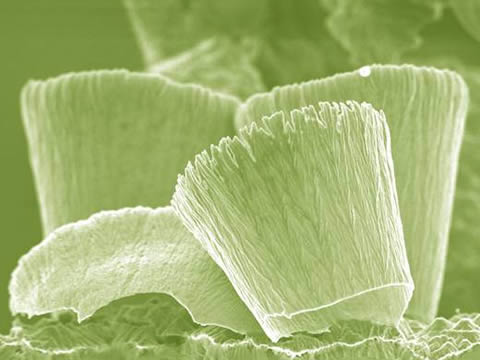
Images by Ghim Wei Ho, a Ph.D. student working for Professor Mark Welland, at the University of Cambridge Nanoscale Science Laboratory.
I’m not one for futurology or singularity watching; there are others much more qualified to do that. But I do read science fiction and a common trope is the matter transformer. Press a button on a small box and the desired product pops out, created as though from thin air. “Computer, I’ll have a latte please, and a choccie bikkie.”
If only.
So when I was browsing this morning’s Grauniad letters page and came across this letter about microfluidic chemical synthesisers and a miniature drug factory in every kitchen my first reaction was “You’re having a laugh, aren’t you?”
Many unmodified patented drugs cost tens of thousands of pounds per year per patient, and many have to be taken for years or for life. Patent law allows private individuals to make anything that is patented without paying a royalty, as long as they are making it for their own use and don’t sell it, or otherwise make a profit from it. Instead of prescribing expensive patented drugs, the NHS could give the patients a microfluidic chemical synthesiser capable of making the drug from its unpatented chemical precursors. Such synthesisers, if mass produced, would cost a few thousand pounds. They would be about the size of a microwave oven, sit in the patient’s kitchen, and each morning would have produced a phial of 5 millilitres of the drug for the patient to put in their orange juice. The NHS drugs bill is currently 6.6bn pound a year, about 13% of total NHS spending. Synthesisers could make a significant reduction in that figure.
Dr Adrian Bowyer Mechanical engineering department, University of Bath
As a kidney patient I’m a walking example of better living through chemistry so naturally something like this would have a huge impact. Really, a black-box drug factory in your kitchen? No more farting around with repeat prescriptions and constant trips to the lab or the pharmacy? Sign me up.
But – it can’t be possible, can it? And even if it were, imagine the actual logistics for organisations like the NHS – the distribution and maintenance of the machines, the constant re-supply of the necesssary raw materials to multiple patients with multiple drug needs, the inevitable cockups and scandals – it would be way beyond their current woeful management capability.
But the writer is an academic at a respectable university and not a crank (unlike some science academics I could mention), so a did a little googling, and Dr Bowyer’s description of this technology is no exaggeration.
Microfluidiic technology isn’t brand new – ‘labs-on-a-chip’ have been available for use in such areas as DNA analysis and genomics, clinical diagnostics, liquid chromatography and bio-defence sensors for quite some time. What’s interesting is the increasing useof microfluidic synthesisers in manufacturing – the implications are huge.
Granted it’s confined at present to creating medical chemicals (as the action is on a molecular scale the equipment’s components have yet to be tested on humans) but stories like this show that we’re on the brink of nanotechnology becoming an everyday reality and that we’ve hardly even noticed it happening.
This is from 2 years ago:
A miniature chemistry set the size of a penny looks set to deliver faster, cheaper imaging agents for positron emission tomography (PET) scans, which are used to see inside patients’ bodies.The microfluidic chip uses a tiny network of channels to shuttle chemicals around, and has valves and purification filters to perform a sequence of chemical steps. The result can produce a chemical that is crucial for PET scans much more quickly and with fewer reagents than a standard lab. This should make scans simpler and cheaper for hospitals.
Microreactors are not a new idea, and are increasingly being used in research laboratories. But many rely on a continuous flow of material from one end of a miniature pipe to the other, without valves and filters. These continuous flow reactors are plagued by cross-contamination of reagents from different chemical steps, says Hsian-Rong Tseng, a pharmacologist at the University of California, Los Angeles, and part of the team that developed the device. This is a significant barrier to using such chips to make pharmaceuticals or other complex chemicals, hesays.The valve-based chip is so versatile that it could become one of the first microreactors in widespread use outside the research lab,
[…]
Making these polymer chips is so simple that with the help of computer-aided design it can take just two days to create a chip to run a particular sequence of chemical reactions, and the average cost is just $10 apiece, says Tseng.
Not only that, but the machinery that makes the chips may soon be able to replicate itself too.
Bowyer leads the RipRap project, a printer that’s able to fabricate three-dimensional artifacts from a computer-based model and which has recently sucessfully self-replicated one of its own components. And what’s best is that Bowyer is a Darwinian Marxist and his own work is all Open Source .
We’re not at the point of the kitchen drug machine yet, but getting there. Imagine the implications when we are – patients and healthcare-providers alike could become liberated from the predations of the global multinational pharmaceutical companies. No wonder those companies’re already angling for a way to make money from this technology.
Quietly a battle for the future of manufacturing is underway: if the multinational biotechnology firms can gain a stranglehold on novel applications of nanotechnological developments then by the foreseeable future, by having manipulated patent law they’ll essentially control the means of production of much more than just pharmaceuticals and test-kits.
So even more well done Dr Bowyer for making his own work Open Source, when you consider the profits he could be making.
But one important question still remains unanswered: can it make tea yet?
Read more: Science, Nanotechnology, Pharmaceuticals, Microfluidic chemical synthesizers, Marxism, Darwinism , Open source, Singularity